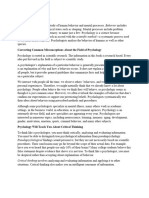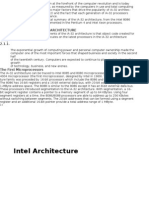Introduction
Uploaded by
mmoriom2002Introduction
Uploaded by
mmoriom2002Introduction
What is Psychology?
Psychology is the scientific study of behavior and mental process of living
organism in relation to its environment.
Firstly, psychology deals with living organism. It primarily focuses on human being
as well as other living organism. Secondly, psychology studies behavior and
mental processes such as perception, cognition, emotion and motivation.
Behavior means those activities of an organism that can be observed by a person.
The next element in the definition is environment. The environment can be
internal or external
According to Crider,
“Psychology can be defined as the scientific study of behavior and mental
process”.
Is psychology a science?
Psychology is considered a science because it uses scientific methods to study the
human mind and behavior. Like other sciences, psychology uses systematic
observation, experimentation, and analysis of data to develop and test theories
about how and why people think, feel, and behave the way they do. Psychology
as a science has several characteristics that distinguish it from other fields of
study. These characteristics include:
Empirical methods: Psychology relies on empirical methods to gather data
about human behavior and mental processes. Empirical methods involve
observing, measuring, and analyzing data to develop theories and test
hypotheses.
Objectivity: Psychology strives to be objective in its methods and findings. It
attempts to minimize bias and subjective interpretations of data.
Control: In case of conducting psychological researches and applying
experimental method and controlled environment is must and variable control is
strictly followed.
Replicability: Scientific studies in psychology should be replicable, meaning that
other researchers should be able to reproduce the results of the study using the
same methods and procedures.
Scientific method: One of the major reasons of psychology being a science is its
adaptation to scientific method. Scientific method is an indispensable tool of
psychological research.
Systematic approach: Psychology is a systematic approach to understanding
human behavior and mental processes. It uses logical and organized methods to
gather data and develop theories.
In summary, psychology is a science because it uses empirical methods, strives for
objectivity, aims for replicability, demands falsifiability, and adopts a systematic
approach to studying human behavior and mental processes.
Perspectives of psychology:
Psychology encompasses a diverse array of perspectives, each offering unique
insights into human behavior, cognition, and emotion. These perspectives often
overlap and can be complementary rather than mutually exclusive. Here are some
of the key perspectives in psychology:
1. The neuroscience/biological perspective:
The neuroscience or biological perspective of psychology looks at how our
brains and bodies influence our thoughts, feelings, and behaviors. It
examines things like brain structure, genetics, and chemicals in the brain to
understand how they impact our actions and emotions. In simpler terms,
it's like studying how the hardware and chemistry of our bodies affect our
thoughts and actions, similar to how a computer's hardware and software
affect its functions.
2. The psychodynamic perspective:
The psychodynamic perspective of psychology focuses on how unconscious
thoughts, feelings, and childhood experiences shape our behavior and
personality. It's like digging into the hidden layers of our minds to
understand why we act the way we do. This perspective, developed by
Sigmund Freud, suggests that unresolved conflicts from our past can
influence our present behavior without us even realizing it.
3. The behavioural perspective:
The behavioral perspective of psychology studies how our actions are
influenced by our environment and experiences. It's like looking at how
rewards and punishments affect what we do. This perspective, pioneered
by psychologists like B.F. Skinner, emphasizes observable behaviors and
how they're learned through interactions with our surroundings.
4. The cognitive perspective:
The cognitive perspective of psychology focuses on how we think, perceive,
and remember things. It's like exploring the "software" of our minds – how
we process information, solve problems, and make decisions. This
perspective, inspired by thinkers like Jean Piaget examines mental
processes like memory, attention, and problem-solving to understand how
they shape our behavior.
5. The humanistic perspective:
The humanistic perspective of psychology emphasizes people's inherent
goodness and their drive to reach their full potential. It's like shining a light
on our desire to grow and improve as individuals. This perspective,
championed by psychologists like Carl Rogers and Abraham Maslow,
focuses on concepts like self-actualization and personal growth,
highlighting the importance of understanding and fulfilling our unique needs
and aspirations.
You might also like
- General Psychology Psychology Human Behavior67% (6)General Psychology Psychology Human Behavior15 pages
- Introduction To Experimental PsychologyNo ratings yetIntroduction To Experimental Psychology19 pages
- Assignment On Introduction To Experimental Psychology86% (7)Assignment On Introduction To Experimental Psychology19 pages
- From Theory to Reality: Embracing Psychology in Everyday ScenariosFrom EverandFrom Theory to Reality: Embracing Psychology in Everyday ScenariosNo ratings yet
- NOTES CLASS 11 Psychology Chapter 1 What Is Psychology100% (1)NOTES CLASS 11 Psychology Chapter 1 What Is Psychology3 pages
- Psychology Summarised Points For Quick RevisionNo ratings yetPsychology Summarised Points For Quick Revision69 pages
- Introduction To Psychology: Course Title: Introduction To Psychology Course Code: Psy-101 Instructor: Ms. Fouzia MobeenNo ratings yetIntroduction To Psychology: Course Title: Introduction To Psychology Course Code: Psy-101 Instructor: Ms. Fouzia Mobeen18 pages
- General Psychology and Life Skills (Psyl 1011) : October, 2019100% (2)General Psychology and Life Skills (Psyl 1011) : October, 201925 pages
- Chapter 1 Essence of Psychology-1_270721091343No ratings yetChapter 1 Essence of Psychology-1_27072109134325 pages
- HP1000 Chapter 1 Psychology Core Concepts NotesNo ratings yetHP1000 Chapter 1 Psychology Core Concepts Notes8 pages
- Assignmet Unit I Introduction To Origin Psychology: Name: A. Sujit Reddy Roll No: 18VF1M3306No ratings yetAssignmet Unit I Introduction To Origin Psychology: Name: A. Sujit Reddy Roll No: 18VF1M330627 pages
- CHAPTER 1 What Is Psychology ExplainationNo ratings yetCHAPTER 1 What Is Psychology Explaination68 pages
- Psycho P Point4 - 5854961480184629886 (Read-Only)No ratings yetPsycho P Point4 - 5854961480184629886 (Read-Only)249 pages
- Psychology: Prepared By: Marianne Delos Santos Xyra Dela Pena Andrei John Loyola Siemark Begil John Rey CrisaldoNo ratings yetPsychology: Prepared By: Marianne Delos Santos Xyra Dela Pena Andrei John Loyola Siemark Begil John Rey Crisaldo26 pages
- Psychology Definition, Field, & Methods: Psychology Is The of and (And How They Are byNo ratings yetPsychology Definition, Field, & Methods: Psychology Is The of and (And How They Are by17 pages
- Psychology of the Human: Fundamental Textbook in Simple Language (classical foundations and quantum horizons): Personal Development, #6.1From EverandPsychology of the Human: Fundamental Textbook in Simple Language (classical foundations and quantum horizons): Personal Development, #6.1No ratings yet
- A Path To Greatness: A Book For India BY Dilip RajeevNo ratings yetA Path To Greatness: A Book For India BY Dilip Rajeev512 pages
- Attachment 2 GRD Request and Inquiry FormRIF 2No ratings yetAttachment 2 GRD Request and Inquiry FormRIF 22 pages
- Polisomnografí A Dinamica No Dise.: Club de Revistas Julián David Cáceres O. OtorrinolaringologíaNo ratings yetPolisomnografí A Dinamica No Dise.: Club de Revistas Julián David Cáceres O. Otorrinolaringología25 pages
- Intel Architecture: 2.1. Brief History of The Ia-32 ArchitectureNo ratings yetIntel Architecture: 2.1. Brief History of The Ia-32 Architecture19 pages
- Murat Khairzhan-Uli Munkin Current Position: Mmunkin@usf - EduNo ratings yetMurat Khairzhan-Uli Munkin Current Position: Mmunkin@usf - Edu5 pages
- Corporate and Business Law (LW-ENG) : Syllabus and Study GuideNo ratings yetCorporate and Business Law (LW-ENG) : Syllabus and Study Guide15 pages
- BADENAS y AURELL, 2004 - Sea Level Changes, JabaloyasNo ratings yetBADENAS y AURELL, 2004 - Sea Level Changes, Jabaloyas17 pages
- Chapter Three Chapter Three The Multiple Linear Regression (MLR)No ratings yetChapter Three Chapter Three The Multiple Linear Regression (MLR)50 pages
- Get Chinese Kites How to Make and Fly Them Direct eBook DownloadNo ratings yetGet Chinese Kites How to Make and Fly Them Direct eBook Download20 pages

























































































